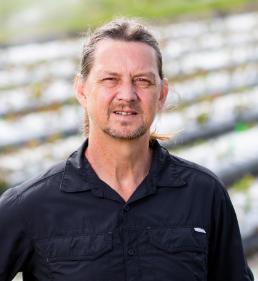Dr. Desaeger's Laboratory
Overview
The Gulf Coast Nematology laboratory is part of the GCREC small fruit and vegetable research and extension team, which includes experts across a wide range of disciplines.
The lab focuses on plant-parasitic nematodes (PPN). In short, nematodes are tiny roundworms that have a huge impact in our world. They have evolved to parasitize every living organism, including all major food crops with crop loss estimated at over 100 billion US$ every year and increasing.
In Florida plant-parasitic nematodes (PPN) are one of the main pests that farmers face. Our lab focuses on studying plant-parasitic nematodes in sub-tropical and tropical cropping systems and developing integrated nematode management (INM) solutions which will help to secure long-term sustainability of agriculture in Florida and similar regions across the world.
What we do
The lab works primarily on developing state-of-the-art nematode management strategies (Integrated Nematode Management, INM) for reducing nematode impacts using chemical, biological, cultural, and genetic methods; this includes evaluating nematicides, organic nematode management, cover crops, resistant cultivars, and monitoring.
Related areas of research, including soil health and quality, natural nematode suppression, and nematode-microbe interactions are an important component of this.
The crop focus of the lab is primarily:
- Vegetables
- Small fruits
- Ornamentals
- Alternative crops
- Cover crops
Research activities include:
- Laboratory
- Greenhouse
- Field studies
Students in our lab are taught to acquire a solid foundation in biology and nematology, including microscopic and molecular skills, and with a solid understanding of the fundamentals of integrated nematode management (INM).
Our lab also maintains close contact and provides nematology support to large and small growers, gardeners, and other stakeholders in Florida.
Impact
PPN are often called the unseen enemy because of their microscopic size, belowground nature, and the lack of easily recognizable symptoms, which is why they are often confused with other problems. Florida seems to possess the requisite soil, humidity and warmth for proper environment of many PPN, and nematode damage is more severe in Florida than in any other US state. Soil fumigation remains the most effective management tool for PPN in Florida.
However, fumigation is expensive, cumbersome, and has many restrictions because of its toxicity and environmental concerns. Our extension focus is therefore to integrate other practices, like more selective nematicides, biological products, resistant or tolerant cultivars, sanitation practices, cover crops and more into existing programs.
Another focus area is the emerging organic industry in Florida, which has been slow to be adopted. The high pest and disease pressure in Florida makes organic production a lot more difficult than in most other regions. However, increasing demand from the public and produce buyers, is now pushing Florida growers towards more organic production. To support this, we now have 20 acres of certified organic research land available at the GCREC research farm.
Nematodes also can cause damage to many of the new alternative crops that are being introduced, such as hops, hemp, artichokes, and many Asian vegetables. To ensure that such crops have a future in Florida, we are also actively supporting these growers.
Contact
Dr. Johan Desaeger
Rm. 135
Gulf Coast Research and Education Center
14625 CR 672
Wimauma, FL 33598
813-419-6592
jad@ufl.edu
Current Lab Members
- Chenzhao Xie, Lab Manager
- Hung Bui, Biological Scientist
- Justin Carter, Field Manager
- David Moreira, PhD
- Laura Mayorga, PhD
- Dustin Jacobs, MS
- Marian Mendez, Intern
-
MS Students' Work
Links coming soon!
-
PhD Students' Work
Links coming soon!
- Dr. Desaegers' Work

